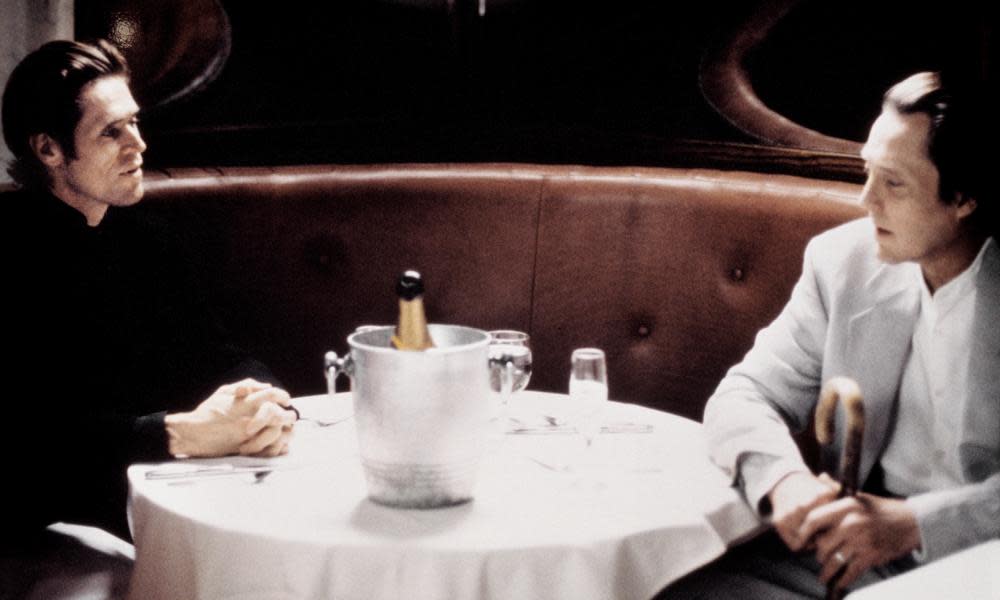My streaming gem: why you should watch New Rose Hotel

Critics balked at the maverick film-maker Abel Ferrara’s woozy erotic drama when it premiered in competition at the Venice film festival in 1998. A scrupulous adaptation of the short story by the cyberpunk pioneer William Gibson, New Rose Hotel is what we might call a film maudit – unfairly maligned and tragically misunderstood. Since then it’s proven awfully prescient, ahead of its time in its anticipation of our digital anxieties and the way screens generate huge chunks of our day-to-day reality. Best known for his gritty crime dramas like Bad Lieutenant and King of New York, Ferrara here envisions futuristic industrial espionage the best way he knows how – with a heavy dose of lo-fi sleaze, sex and delirium. That said, expect a conventional thriller and you’ll be disappointed – call it instead an existential techno-erotica, one that tackles the nature of desire in an atomized, transactional world.
Related: My streaming gem: why you should watch Sand Storm
The story follows Fox (Christopher Walken) and partner-in-crime X (Willem Dafoe), two extraction specialists hired by a rival company to lure supergenius Hiroshi (Yoshitaka Amano) away from his current employer. Fox enlists slinky Shinjuku call-girl Sandii (Asia Argento) to set a honey trap sticky enough to draw Hiroshi away from his wife and kids. With hot-red puckered lips, a wispy Italian accent and a kittenish bob, Sandii attracts more than her designated target. Puppy-eyed X soon falls for the vulpine seductress as well. Sandii returns his affections – or so it seems.
Hiroshi we never meet face-to-face; he’s kept at a distance as a two-dimensional object to be tracked and manipulated via the many screens in play. In fact we experience much of the plot through fragmented, grainy video footage and monitors that not only deny us the fuller, clearer picture, but make us question the very things we’re seeing. There’s something of David Lynch’s Lost Highway here, the way recorded images toy with perception, and function as instruments of paranoia.
What does the world look and feel like when so much of what makes it go round is intangible?
The Tokyo setting summons the feeling of hi-tech, white-collar global conspiracy breathing down our protagonists’ necks. But most of what we see takes place in nondescript, impersonal spaces, bland hotel rooms and hazy nightclubs that could be anywhere in the world. We’re told of dealings in Berlin, Marrakech and Vienna, but because they’re intentionally not visualized these places lose any meaningful distinction beyond words. Everywhere is nowhere is everywhere.
Yet there’s a lurid, anguished pulse beneath the film’s bleak, impersonal vision of the transactional relationships that dictate reality. This is due in no small part to its electrifying cast, a team of Ferrara regulars happy to indulge the director’s freewheeling tendencies and kinky fascinations. As the hobbling, philosophizing brains behind the operation, Walken’s Fox is a thrilling loon, practically tap-dancing through the movie as he riddles his way through schemes and deal brokerings, wooden cane always in hand. You’ll want to pay extra close attention when he speaks – beyond Walken’s musical, mad-hatter delivery, Fox’s rhetoric is full of sinister double meanings and snippy, profanity-laced insights. The relationship between X and Sandii is the film’s raw, sensual core – Argento with her tongue-flicking coyness, Dafoe with his besotted, adoring gaze. They’re the most palpable, fleshy elements of an otherwise spectral movie.
It’s clear from the get-go that shifty-eyed Sandii, symbolically dressed in scarlet, is being set up as a sort of femme fatale. In the trio’s first scene together, Sandii performs her seduction of Hiroshi, and we’re left wondering when and with whom she’ll also play pretend. Alfred Hitchcock’s Notorious comes to mind – despite Cary Grant’s affections, Ingrid Bergman’s character is also pushed into a relationship with another man for strategic reasons. But Sandii’s feelings towards X are ultimately more ambiguous, and the implications of her role as a sex worker in a world puppeteered by condescending men like Fox are thrillingly provocative.
It’s no spoiler to say that X eventually ends up in the eponymous capsule hotel – this is actually the starting point for Gibson’s story, while the rest of the plot plays out as a series of flashbacks. Ferrara’s adaptation doesn’t meddle with nostalgia until the final act, but the movie’s otherwise moody, atmospheric quality – punctuated by funky trip-hop interludes – captures the text’s dreamy intentions. And as we hunker down at home clinging to memories of happier times, tearfully scrolling through old pictures on our phones, I can’t help but feel kinship with Dafoe’s lovesick hero, holed up and pining over what could have been.
New Rose Hotel is available on Amazon Prime in the US and UK

